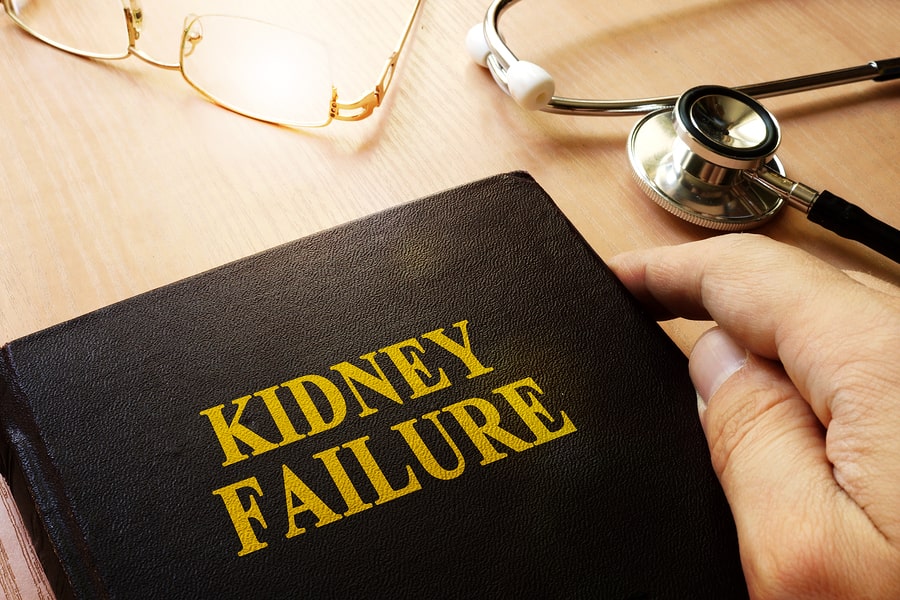Fighting for Dialysis Patients’ Wrongfully Denied Long-Term Individual and Group Disability Benefits from Coast to Coast

Did you know that one in six Americans has chronic kidney disease (CKD)? That’s almost one person per American family. CKD causes a reduction in kidney function that can worsen with time, preventing your body from filtering out the toxic waste naturally produced by your cells. CKD eventually leads to end-stage renal disease (ESRD), or kidney failure.
You’ll require dialysis or a kidney transplant to survive once you enter into ESRD. This is a significant and debilitating disease that may immediately qualify you for private and federal long-term disability benefits. You may even require individual or group long-term disability benefits after a kidney transplant as you adjust to immunosuppressant medications and ensure your body accepts the foreign kidney. More than half a million Americans are in kidney failure today and the majority of them are on dialysis and awaiting a transplant.
Dialysis itself typically takes about four hours, and most patients need it at least three times per week. This dialysis time doesn’t include travel time to and from the dialysis center and any time it may take to recover from the procedure. Essentially, most dialysis patients are rendered completely unable to perform the important duties of their occupations. The situation doesn’t get better without a kidney transplant, as modern medicine cannot account for the extraordinary design and function of the kidneys.
You may claim individual or group long-term disability benefits if you develop CKD or its typical complications. Dialysis patients may also desperately need individual or group long-term disability benefits. Unfortunately, they may find themselves so overwhelmed with treatment they don’t have time to fight a wrongful delay, denial, or termination of individual or group long-term disability benefits. Most patients on the kidney donor list wait between five and 10 years for a transplant. That’s five to 10 years of benefits your individual or group long-term disability insurer won’t want to pay.
At DarrasLaw, we know how to fight your disability insurance company’s denial tactics. Our founding partner, Frank N. Darras, and his firms have recovered nearly $1 billion in wrongfully delayed, denied, and terminated insurance benefits, and we’d like to help you. Call us today at 800-898-7299 or contact us online to schedule your free disability policy analysis and free claim consultation.
Understanding Kidney Disease
It’s extremely rare for healthy, working-age individuals to enter renal failure without warning. Kidney failure typically develops with time and begins with chronic kidney disease.
However, an acute kidney injury can cause sudden but temporary kidney failure. Physical damage to a kidney from penetration can also cause an acute kidney injury. Fortunately, treating physicians can often correct this type of kidney damage with surgery, and these injuries typically affect only one kidney.
The following injuries or illnesses may cause acute kidney failure:
- Rapid blood loss
- Extreme drop in blood pressure
- Disruption of blood flow to the kidneys
- Serious burns
- Physical injuries to the kidneys or the surrounding blood supply
- Infections such as sepsis
Acute kidney failure doesn’t occur due to a disease of the kidneys themselves. Accordingly, treating the cause of the blood loss or infection might restore your kidney function without the need for dialysis.
Chronic kidney disease is degenerative in nature. It seldom results in immediate renal failure. Instead, it shuts down your kidneys in the following stages:
- Stage 1 – In Stage 1 kidney disease, relatively normal kidney function remains. Your kidneys will still filter the necessary toxins from your body, but at a slightly lower rate. No symptoms are typically associated with Stage 1 kidney failure. Those who know if they’re in kidney failure this early on are probably predisposed due to a related disease. They may have high blood pressure, diabetes, or a family history of kidney cancer.
- Stage 2 – Mild loss of kidney function occurs during stage 2 CKD, but it’s similar to stage 1. Your kidneys don’t need to function at 100 percent to do their job, which means your body can sustain a mild loss of kidney function without symptoms. Eating healthy and exercising can help manage mild loss in kidney function.
- Stage 3 – At stage 3, your kidneys are not fully functional, and toxins begin to build up in your blood. This causes fatigue, high blood pressure, bone disease, shortness of breath, swelling, and pain. You can eat healthy and take medications that may prevent stage 3 kidney failure from developing into stage 4, but it’s nearly impossible to reverse the progressive damage.
- Stage 4 – In Stage 4 CKD, the kidneys have sustained severe damage. You may need to begin dialysis or prepare for a living donor kidney transplant. The toxic build-up in your body becomes dangerous during this time, and you may begin vomiting, losing your appetite, finding difficulty concentrating, and experiencing numbness in your toes and fingers. You’ll begin to lose your red blood cells as well, which leads to anemia, heart disease, and bone disease.
- Stage 5 – Stage 5 CKD is another term for end-stage renal disease or kidney failure. You may lose the ability to make urine, and toxins will build up and cause swelling throughout your body. You will need dialysis or a kidney transplant to live with stage 5 kidney failure as your kidneys become completely unable to remove the body’s waste.
End-stage renal failure brings to light the importance of your kidneys, which do more than filter waste. They produce the hormones that make red blood cells and activate vitamin D in your body, promoting strong and healthy bones. Your kidneys also help regulate your blood pressure. Losing kidney function does more than cause toxic build up. It begins to break down your body. It’s nearly impossible to live and perform the important duties of any occupation with end-stage renal failure.
Risk Factors and Complications Associated With Kidney Disease
Most treating doctors will monitor your kidney function during routine checkups. Sometimes kidney failure results from an underlying genetic condition, and sometimes it’s related to poor lifestyle choices or a traumatic accident. The following risk factors can increase the likelihood that you will develop kidney disease:
- Diabetes, either Type 1 or 2
- Inflammation around the kidneys caused by autoimmune conditions
- High blood pressure
- Kidney cysts
- Kidney cancer
- Enlarged prostate
- Kidney stones
- Smoking
- Heart disease
- Obesity
- Old age
- Genetics
- Drug overuse
- Habitual kidney and urinary tract infections
- Urine backup into your kidney
- Abnormal kidney development/structure
Kidney damage leading to chronic kidney disease and in turn kidney failure is often related to obesity, smoking, and overuse of aspirin and certain pain relievers.
Your kidneys can heal themselves to a certain extent. For example, a puncture wound to the outer wall of a kidney may scar and heal. However, if the delicate nephrons that make up your kidneys sustain damage because of kidney disease, they will not regenerate. Your nephrons actually filter the blood in your body, removing toxins. Each kidney contains more than one-million nephrons, so that you can function with a minor loss.
Severe damage to your nephrons will render your kidneys all but useless, leaving you with the following complications from kidney disease and kidney failure:
- Swelling in your arms, legs, and lungs due to fluid retention. This can lead to life-threatening pulmonary edema
- Anemia from loss of red blood cells, which your kidneys regulate. This can lead to extreme fatigue
- Risk of serious bone fractures due to weak bones and lack of vitamin D absorption
- Heart disease
- Permanent central nervous system damage from the build-up of toxins
- Reduced immune function, leaving you vulnerable to opportunistic infections
- Pregnancy complications
- The destruction of your kidneys
A diagnosis of stage 1 or 2 kidney disease may or may not qualify you for individual or group long-term disability benefits. Whether you qualify for individual or group long-term disability benefits depends on how your kidney disease affects your ability to perform the important duties of your occupation.
Your kidneys do more than filter your blood, however. Kidney disease at any stage can lead to heart disease, painful swelling, and bed-rest during pregnancy. Any of these conditions may qualify you for individual or group long-term disability benefits if they prevent you from performing the important duties of your occupation.
Treating End-Stage Kidney Failure
There’s simply no way to replace the millions of nephrons present in each kidney. You only have two options once your nephrons are extensively damaged and you enter into end-stage renal failure: kidney transplant and/or lifetime dialysis.
The majority of claimants in kidney failure are waiting for a transplant while on dialysis. Your position on the transplant list depends on the severity of your condition, your age, and your overall health.
The two primary transplant options are a living donor transplant and a deceased donor transplant. A living donor, such as a sibling or cousin, can donate a healthy kidney if you share compatible immune systems and blood types. You’ll have to wait for a deceased organ donor if you have no compatible living donors. This means you’ll need to remain on call, near a transplant center, which can seriously limit your ability to perform the important duties of your occupation.
Most patients with ESRD require either peritoneal dialysis or hemodialysis. Both procedures replace specific kidney functions by filtering the toxins from your blood. Peritoneal dialysis consists of inserting a hollow tube into the abdomen where a special solution is then filtered through. The solution helps absorb toxins from your body, and once it has done its job, your healthcare professional will drain it. Hemodialysis consists of siphoning blood from your body into an artificial kidney, which removes excess waste, salt, and water using a special solution before the system returns the blood to your body. Hemodialysis is typically performed three times a week for as long as five hours at a time, and may result in more serious complications.
Individual or Group Long-Term Disability Benefits for End-Stage Renal Disease
Healthcare professionals widely acknowledge that end-stage renal failure leaves most claimants totally disabled. You’ll typically qualify for long-term disability benefits and for Social Security if you have need or the requisite quarters of earnings if a treating physician has diagnosed you with stage 5 kidney failure because you’re likely unable to engage in any type of meaningful work for which you’re trained, educated, or suited, taking into consideration your station in life.
SSDI benefits, however, seldom cover your cost of living, especially with mounting medical bills. Claimants with ESRD are immediately eligible for Medicare no matter their age. This can help cover the cost of expensive dialysis.
Medicare and SSDI may still not provide enough income to get by. Claimants may need to turn to their individual long-term disability benefits, or the group long-term disability insurance offered through their employer.
Many individual and group long-term disability insurance companies will try to deny ESRD benefits, claiming in bad faith that your condition is “preexisting.”
Your individual or group long-term disability insurer will also offset benefits you receive or are eligible to receive from SSDI, but you may claim both. You’re entitled to receive individual or group long-term disability benefits for kidney disease at any stage provided you’re unable to perform the important duties of your occupation.
Don’t be surprised if your individual or group long-term disability benefits are wrongfully delayed, denied, or terminated, even if your ESRD didn’t arise from a preexisting condition. Our compassionate long-term individual disability lawyers and experienced group ERISA attorneys are here for you at DarrasLaw.
Contact the Award-Winning Long-Term Disability Attorneys and Top-Rated Group ERISA Lawyers at DarrasLaw Today
While the prospect of fighting a wrongful delay, denial, or termination of individual or group long-term disability benefits is daunting during dialysis, the stellar individual disability attorneys and seasoned group ERISA lawyers at DarrasLaw know how to do it. No case is too large or small and no venue is too far for DarrasLaw. With more than 100 years of combined litigation and claim experience in the field of long-term disability law, our premier individual disability lawyers and preeminent group ERISA attorneys have seen it all. We know the complicated ERISA law inside and out, and how to make its provisions work for you.
Led by award-winning disability attorney Frank N. Darras, DarrasLaw’s nationally respected individual disability lawyers and prominent group ERISA attorneys know how to get our clients the individual or group long-term disability benefits they deserve. To schedule your completely free disability policy analysis and free claim consultation, call us today at 800-898-7299 or contact us online.













